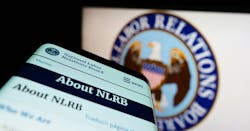The U.S. Department of Justice (DOJ) Antitrust Division and the National Labor Relations Board (NLRB) signed a joint memorandum of understanding (MOU) with the stated objective of “promoting the free flow of commerce and fair competition in labor markets.”
The new MOU is similar to one that was entered into by the NLRB and Federal Trade Commission (FTC) earlier, which also has the goal of protecting the interests of organized labor and deploying the broadest power of federal government authority to bear on employers who are perceived as violating labor law and worker rights.
“Protecting competition in labor markets is fundamental to the ability of workers to earn just rewards for their work, to live out the American dream, and to provide for their families,” said Jonathan Kanter, assistant attorney general of the DOJ Antitrust Division. “By cooperating more closely with our colleagues in the NLRB, we can share information on potential violations of the antitrust and labor laws, collaborate on new policies and ensure that workers are protected from collusion and unlawful employer behavior.”
NLRB General Counsel Jennifer Abruzzo commented, “When businesses interfere with workers organizing, either through creating structures designed to evade labor law or through anticompetitive practices, it hinders our economy and our democracy.”
Both DOJ and the NLRB said they “share an interest in promoting open and competitive labor markets, including through protecting American workers from collusive or anticompetitive employer practices and unlawful interference with employees’ right to organize.”
The MOU states that the two agencies intend to collaborate by:
- Appointing Liaisons. They will designate one or more points of contact to meet, at least quarterly, to discuss topics of mutual interest to the agencies.
- Information Sharing. The agencies plan to share complaints, investigative files, reports and guidance on policy and enforcement matters.
- Training, Education and Outreach. They also will provide training to each other’s staff to help them identify cases and issues that may arise under the other agency’s jurisdiction. They also anticipate engaging in public outreach and education, developing joint policy statements to increase public awareness of their respective missions, and sharing or developing joint training materials and programs.
- Coordinated Enforcement. The agencies intend to establish procedures for consulting and coordinating at various stages of their respective antitrust and labor law investigative and enforcement activities, aiming to promote coordinated enforcement initiatives, increase efficiency and minimize duplication. The coordination will include periodically consulting with each other regarding specific complaints or unfair labor practice charges.
- Referrals. The agencies will potentially refer matters to each other when one agency’s investigation uncovers conduct falling within the purview of the other agency. For example, when the NLRB detects potential antitrust violations while investigating conduct under the National Labor Relations Act (NLRA), it will evaluate the conduct and potentially refer the matter to the Antitrust Division, which will then determine whether to open its own investigation into the conduct.
The earlier MOU entered into by the FTC and the NLRB on July 19 also seeks to facilitate cross-agency information sharing and consultation, training, and public outreach and education.
These agreements are part of an ongoing trend federal agencies embarked upon as soon as President Biden took office. To reward his political allies in the union movement, he directed agencies to cooperate broadly on issues to help promote labor unions through an aggressive campaign of labor law enforcement, rulemakings and public education about workers’ rights to organize and to complain about alleged employer abuses.
Last year, the President’s staff also assembled a senior level policymaking group called the Task Force on Worker Organizing and Empowerment, which was chaired by Vice President Kamala Harris and Labor Secretary Marty Walsh and was made up of other cabinet officers and top White House advisors. These MOUs were among that task force’s recommendations.
About the Author

David Sparkman
founding editor
David Sparkman is founding editor of ACWI Advance (www.acwi.org), the newsletter of the American Chain of Warehouses Inc. He also heads David Sparkman Consulting, a Washington D.C. area public relations and communications firm. Prior to these he was director of industry relations for the International Warehouse Logistics Association. Sparkman has also been a freelance writer, specializing in logistics and freight transportation. He has served as vice president of communications for the American Moving and Storage Association, director of communications for the National Private Truck Council, and for two decades with American Trucking Associations on its weekly newspaper, Transport Topics.
